Indiana Jones and the Last Crusade is the third, but not final instalment in the legendary Indiana Jones series. The first film is still one of the best movies in cinematic history, with the second film grossly incapable of recapturing the charm and appeal of its predecessor. This next Indiana Jones adventure is the best sequel thus far. The filmmakers have almost equalled the brilliance of the first flick. Just like the original movie, Indiana Jones and the Last Crusade is a faultless blend of action and adventure with intrigue and romance thrown into the mix.
The opening sequence is always a pivotal part in the success of these movies. In this case the film opens with a prologue that traces the roots of Indy as we now know him. This prologue digs into his fear of snakes, delves into why he has a scar on his chin, the reasoning behind his passion for relic hunting and how he came into possession of his trademark items. This prologue also serves as an artefact hunt that acts as a bridge into the main plot.
Everyone's favourite treasure-hunter-come-professor Indiana Jones (Ford) whips back into action with a hunt for yet another ancient relic. Indy is taken to meet a wealthy ancient relic devotee named Walter Donovan (Glover). Walter explains that recent discoveries have been made that may possibly point to the locality of the Holy Grail - the cup Jesus Christ theoretically drank from at the last supper. Indy is also informed that the project leader has gone missing; said leader is none other than Professor Henry Jones Sr. (Connery), Indy's father. With his father's Grail scrapbook in his pocket, Indy heads to Venice in search of his father. The adventure then moves to Germany during the height of the Nazi regime. It then becomes a race against time as Indy and his father scramble to find the location of the Holy Grail before the Nazis get there first.
Indiana Jones and the Last Crusade is of course filled with endless action and excitement. Just like Raiders of the Lost Ark this film is a myriad of now memorable scenes. Some of these unforgettable scenes include a desert scene with a large tank, Indy inadvertently getting the autograph of Adolf Hitler, avoiding a nest of rats in the catacombs underneath a library, a battle in the air and a great scene set inside a German blimp.
Harrison Ford is every bit as charming and appealing as he was when the series commenced in 1981. Ford is always fit for action and is given a plethora of clever lines to work with. The casting department of these films will endlessly receive compliments and recognition for their superb choice of actors. Sean Connery is perfect in the role he was born to play. Formerly playing the role of James Bond, Connery is an absolutely ideal choice. The chemistry between Ford and Connery never feels at all contrived. The two feel like a genuine pair of father and son. More appraisal for the casting department as the rest of the supporting cast is equally remarkable. Denholm Elliot, John Rhys-Davies, Julian Glover, Alison Doody...they are all outstanding.
No Indiana Jones film is complete without the brilliant directing from Steven Spielberg and the exciting music from John Williams. Composer Williams excels himself with the music in this film. There is plenty of action accompanied with a perfect score. The special effects still look elegant and hard to fault. I adore the use of old school effects. In this case everything is done practically and all special effects objects actually have a screen presence. The cinematography is also a major stand out with this film as well.
Indiana Jones and the Last Crusade satisfied my every requirement in an adventure movie. Loads of action, plenty of witty dialogue, well conceived characters and a high level of excitement. Many have tried, but no-one can ever match the brilliance of the Indiana Jones movies. They don't make movies of this elegance anymore. Followed 19 years later by Indiana Jones and the Kingdom of the Crystal Skull.
9.85/10
Excellent adventure movie!
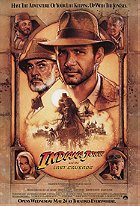 Posted : 17 years, 1 month ago on 22 May 2008 11:55
(A review of Indiana Jones and the Last Crusade)
Posted : 17 years, 1 month ago on 22 May 2008 11:55
(A review of Indiana Jones and the Last Crusade) 0 comments, Reply to this entry
0 comments, Reply to this entry
Solid sequel.
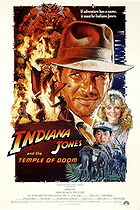 Posted : 17 years, 1 month ago on 22 May 2008 11:36
(A review of Indiana Jones and the Temple of Doom)
Posted : 17 years, 1 month ago on 22 May 2008 11:36
(A review of Indiana Jones and the Temple of Doom)
The original Indiana Jones film was a little known production that became a worldwide hit. After the great success of Raiders of the Lost Ark it was inevitable that the team would get back together and produce another ripping yarn of an action/adventure flick. Indiana Jones and the Temple of Doom is certainly the weakest Indiana Jones film to date. After watching it again after all these years I am reminded that even the worst film of a film series can still be bucket loads of fun.
Temple of Doom is a prequel to the original Indiana Jones film, this time set in 1935 before the Nazi occupation commenced. At the beginning of this film we are once again introduced to the legendary archaeologist with a weakness for adventure, Dr. Indiana Jones (Ford). Jones narrowly escapes a group of Chinese gangsters in a nightclub in Shanghai, ending up stranded in a remote location in India. He finds himself being partnered with a young Asian boy named Short Round (Quan) and a head-aching nightclub singer named Willie Scott (Capshaw, who ended up marrying director Steven Spielberg). The trio come across a devastated village that is under crisis. Their children have been taken and their precious stone stolen. The villagers believe Jones and his companions were brought here for a specific reason: to recover their precious stone and the missing children that they hold dearly. Trekking across the thick jungles of India the gang reach the enigmatic Pankot Palace where they are openly welcome. Indy is then faced with a baffling religious ceremony in a mystifying temple. With two companions and a whip by his side, Indy must battle the powerful forces of evil in order to recover the sacred stone and the young children that were taken as slaves.
Indiana Jones and the Temple of Doom is a lot darker and more sinister than its forerunner. We still have the gorgeous locales and elaborate sets, but we are also given some menacing horror scenes that will easily frighten young viewers. Especially when the action moves to the temple, things suddenly become exceedingly shocking. I remember being quite disturbed by these sequences when I was a youngster.
The charm and wit of Harrison Ford has not disappeared at all. Ford is energetic, funny, and sublime as Indiana Jones. The character is still whip-touting and skilled. His dialogue is impeccably written and faultlessly delivered. There is no wonder why Indiana Jones was voted several times as one of the best action heroes of all time. Kate Capshaw will make your head hurt. Throughout the whole film she's endlessly whining or complaining about the conditions. Her character is cleverly constructed; however she's just the essential clichéd damsel in distress. The first film boasted a feisty female lead who suffered from very few fundamental conventions. Recognition must go to Jonathan Ke Quan, a young actor who does a stellar job.
Steven Spielberg is the only man with the skill to helm a successful Indiana Jones film. Even with dated visual effects and limited resources, Spielberg is an accomplished director competent in bringing words on the page to life with great results.
Like the first film, this instalment is filled with stacks of stunts and spectacular special effects that are so abundant that it never leaves us any time to breathe. Unsurprisingly, the film is topped off gorgeously with the rollicking score courtesy of acclaimed composer John Williams.
Indiana Jones and the Temple of Doom was never going to improve upon the original movie. Be that as it may, this prequel to the successful 1981 adventure film is influential and entertaining. Followed by Indiana Jones and the Last Crusade.
7.85/10
 0 comments, Reply to this entry
0 comments, Reply to this entry
Superb adventure movie!
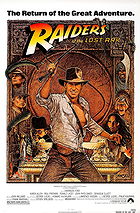 Posted : 17 years, 1 month ago on 22 May 2008 11:25
(A review of Raiders of the Lost Ark)
Posted : 17 years, 1 month ago on 22 May 2008 11:25
(A review of Raiders of the Lost Ark)
The Indiana Jones films became the most influential adventure films in cinematic history. The films made their mark on the genre and still influence the way adventure films are made to this day. What's the allure of the series? Put rather simply, all the Indiana Jones films impeccably merge action, exhilarating adventure, dazzling locations, marvellous humour and a mixture of great characters. Raiders of the Lost Ark is the first instalment in the highly acclaimed Indiana Jones series, and still the superior film. The elegance and class of this movie is so far unrivalled and unsurpassed even after several decades.
Set in 1936 on the eve of World War II, Dr. Indiana Jones (Ford) is a renowned archaeologist and a famed adventurer. Jones grows tired of lecturing students at a university; instead he adores trekking through the jungle touting a whip and a gun while searching for ancient artefacts. After an incredibly memorable opening sequence set in Africa, Indy is hired by the United States government to investigate the possible existence of the 'Ark of the Covenant'; an ancient relic that appears to be the cause of strange doings by the Nazis. Indy is pitted against rival archaeologist René Belloq (Freeman) who is also searching for this illustrious ark that has been nothing but myth and legend for centuries.
This fascinating story is merely the beginning as the film rapidly moves to numerous different locations around the globe from Nepal to Cairo.
Harrison Ford is unreservedly perfect for the principal role of Indiana Jones. Ford possesses that certain look about him that suits the role of both an adventurer and a professor. His dialogue is delivered extraordinarily, and his on screen magnetism is one of the film's highest points. Ford has all the wit and appeal: the character of Indiana Jones is the essential embodiment of an adventure hero that encompasses all the qualities and the charisma that makes him one of the best action heroes of all time (as voted on several occasions). Ford is partnered with the equally charismatic Karen Allen. Playing Indy's love interest, this isn't the usual clichéd damsel in distress who can't fend for herself. On top of this there's a remarkable performance by John Rhys-Davis, and unforgettable performances from both Paul Freeman and Ronald Lacey.
Steven Spielberg's direction is magnificent. This focused directing and the lavish cinematography are qualities rarely seen in contemporary adventure movies. I particularly loved the old school effects and the elaborate sets. With such gorgeous images on the screen for every second of the film's duration, it effectively moves from one memorable scene to the next.
The opening artefact hunt is still my favourite film opening of all time. Not to mention all the other memorable scenes - the bar fight, the plane scene, the snake pit, the truck chase, the ship battle, the final showdown...it's impossible to spot a dull second amongst the action and adventure. The outlandish stunts are a requirement for an adventure film of this calibre. The filmmakers deliver a never-ending supply.
The film is only made better by the accompanying exciting music by John Williams. The classic Indiana Jones theme is still my favourite movie theme of all time! The exhilarating action is only made better by the triumphant, invigorating music.
The special effects delightfully hold up even after all these years. With filmmaking technology forever advancing I am pleased and happy to see such terrific old school effects that still look mighty impressive.
When I was a youngster I remember watching Raiders of the Lost Ark on various occasions. The first three Indiana Jones films were an essential part of my childhood. Now that I've aged and matured I still love these original three films tremendously. This is unquestionably one of the best movies of all time! Followed by several sequels beginning with Indiana Jones and the Temple of Doom (this is actually a prequel).
10/10
 0 comments, Reply to this entry
0 comments, Reply to this entry
Very funny!
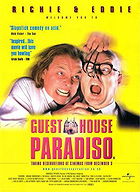 Posted : 17 years, 1 month ago on 21 May 2008 10:29
(A review of Guest House Paradiso)
Posted : 17 years, 1 month ago on 21 May 2008 10:29
(A review of Guest House Paradiso)
Guest House Paradiso is a comedy filled to the brim with nothing but non-stop laughter, physical gags and sexual innuendo. The creative team behind this film also created two popular TV shows: The Young Ones and Bottoms. The whole film is beguilingly tempting comedy - each scene being nothing more than a myriad of hilarious gags and little plot emerging.
Richie (Mayall) and Eddie (Edmondson) run the worst hotel in the entire British Isles: thieving manager, drunken immigrant chef and a former mental patient for a waiter. This is a hotel that makes Fawlty Towers look like attractive 5-star accommodation. The two bumbling nitwits, Richie and Eddie, have their establishment right next to a nuclear power plant. The only regulars at the hotel are a bunch of power plant workers who drop by to get drunk, as well as an elderly woman named Mrs. Foxfur (Fielding) who appears to be conned quite frequently. After an opening that clearly shows the kind of stupidity the two protagonists continually exhibit, the hotel is cleared of many residents. Things begin looking up when a small family voluntarily checks in for a stay. They are then overshadowed when beautiful famed actress Gina Carbonara (Mahieu) checks in with the intent of escaping her Italian playboy fiancé that she doesn't want to marry. What follows is a night of complete disaster. Radioactive fish, crazed Italian, vomiting house guests...everything imaginable as the central characters move from one disaster to the other.
Guest House Paradiso focuses solely on the laughs as opposed to a plot. It's a difficult task to justifiably outline the plot in any great detail because everything would then be spoiled. As an alternative to a plot we just have a straightforward series of events. With the thought in mind of a night of plain disaster, we are treated to a repulsive (occasionally disturbing) series of events. By the end of it you will want to vomit as strongly as some of the guests. During the film's final 40 minutes of non-stop hilarity and gags I was both choking with laughter and feeling mighty queasy from the disgusting events that unfold.
The two main characters are a talented duo that will be familiar to fans of the creative team. Both Rik Mayall and Adrian Edmondson have their moments of utter hilarity. It's the clichéd odd couple: one of them has brains (using those words loosely), the other does not. Those of you familiar with the film will agree when I say that the opening kitchen brawl shows the agility and talent of the two leading performers. It's a hilarious combination of slapstick gags with some overwhelming violence (surprisingly enough). This string of nothing but gags and laughter is very memorable as well. You will either be quoting the dialogue, re-enacting scenes or discussing these scenes in detail with another who has seen it.
From the front cover and trailer, Guest House Paradiso promised to be nothing more than a bit of light-hearted entertainment that isn't at all tasteful. This assumption is extremely correct - it's nothing but funny mindless gags that make a fun way to spend 85 minutes of your time. Not classic comedy in any sense, but if you're easily entertained and enjoy puerile, disgusting humour then this is the one to rent (or buy).
 0 comments, Reply to this entry
0 comments, Reply to this entry
A solid sequel!
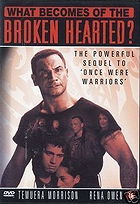 Posted : 17 years, 1 month ago on 21 May 2008 01:15
(A review of What Becomes Of The Broken-Hearted?)
Posted : 17 years, 1 month ago on 21 May 2008 01:15
(A review of What Becomes Of The Broken-Hearted?)
Lee Tamahori's 1994 low budget New Zealand film Once Were Warriors was critically commended and praised for its uncompromising, potent examination of the sinister side of the Maori population. Due to its colossal universal sensation it was virtually predestined that the studio would demand a sequel. In this case, Once Were Warriors is far too brilliant and unbeatable; consequently nobody ever expected this sequel to surpass its forerunner. Films like Once Were Warriors are austerely one-off successes. Nevertheless, What Becomes of the Broken Hearted? stands on its own intrinsic worth as an outstanding movie that is different in its own unique way.
It has been five years since the events of the first movie. We resume the story of Jake 'The Muss' Heke (Morrison): a man whose sweltering temper interfered with his family, progressively giving them additional incentive to leave him. The first movie was a story of his wife Beth (Owens); however this film barely concerns Beth at all - in fact we hardly even see her - instead this is the story of Jake and his search for redemption. Jake realises that his fiery anger only detached him from his family. He recognises that he has serious problems affecting his life, and he must confront them to prevent further loss.
The story of What Becomes of the Broken Hearted? is separated into two threads. The first thread is of Jake Heke's pursuit for salvation, and the second is of Jake's son Sonny (Eruera) who clouds his future by joining a rancorous street gang. Sonny wants revenge on the gang who were responsible for the murder of his brother. These two threads of narrative are united with a bang towards the film's conclusion.
This film is extremely different to the style and storytelling of its predecessor. What Becomes of the Broken Hearted? still delivers a mighty kick in the gut and is an uncompromising story; however the original is far more raw around the edges and abundant in mature themes. This film showcases a lot of profanity and some strong violence, especially when it comes to utilisation of firearms. Lots of brutal violence is featured in the scenes that feature Jake bashing up a few characters. The end gang fight is especially heavy and really hits home.
This potent drama is fuelled by some terrific performances. Some people will complain about the thick New Zealand accents. This complaint is obligatory for most American audiences. However the accents add realism and potency to the film. Temuera Morrison is nothing short of outstanding with his a passionate, poignant portrayal of a man living a tragic life. When the sizzling temper of Jake Heke takes control it's impossible to fault his complete concentration. Towards the end of the film in particular his performance will leave you absolutely speechless. Morrison's performance towers above anyone else in the cast. In a sense he's the prominent leader being supported by a group of grunts. Of course the rest of the cast do a good job...they just can't match the brilliance of Morrison.
Ian Mune must have been nervous about taking the reigns after Lee Tamahori directed the first instalment. Similar to the first movie, Mune is able to establish a raw atmosphere that examines people at their lowest ebb. The first film was shot using grainy photography to make it feel raw and authentic. This effect has been completely retracted here, unfortunately.
Overall, What Becomes of the Broken Hearted? is a solid, strong sequel to the excellent Once Were Warriors. It's fascinating to see a refined Jake Heke who has changed his ways and has confronted his problems. On the contrary the character is a lot stronger and better developed in the first movie. This character alteration is both good and bad: draw your own verdict. Do not consider watching this film if you haven't seen the original. If you have seen the original it is not vital to see this one, although it is an interesting continuation of the story.
 0 comments, Reply to this entry
0 comments, Reply to this entry
Classic comedy!
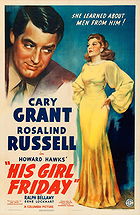 Posted : 17 years, 1 month ago on 21 May 2008 09:25
(A review of His Girl Friday)
Posted : 17 years, 1 month ago on 21 May 2008 09:25
(A review of His Girl Friday)
His Girl Friday is a hysterically funny screwball comedy masterpiece by one of cinema's greatest directors, Howard Hawks. This film is purely one of the funniest classic comedies I've ever seen. Although roughly 70 years old the film is still a wickedly enchanting oddball comedy, and its original impact has only marginally dissipated.
Based on a successful Broadway smash (that was filmed as a movie) by Ben Hecht and Charles MacArthur, the film follows conniving newspaper editor Walter Burns (Grant) who works for the Morning Post. Former ace reporter Hildy Johnson (Russell) returns to the Morning Post to tell her ex-husband Walter that there's a new lover in her life, and to bid him farewell one last time. Hildy plans to give up her life as a newspaper reporter, instead settling into a world of domesticality with her new fiancé Bruce Baldwin (Bellamy). Walter is not willing to let Hildy leave the newspaper, thus determined to get her to stay and to get her heart back he hatches a cunning plan to lure her back to the Morning Post. He plans to involve her in the paper's crusade to free convicted murderer Earl Williams (Qualen) from death row. While in a moment of madness, Williams shot a coloured policeman resulting in his conviction. Walter knows that Hildy has the perfect feminine touch to place Williams in a sympathetic light and hence get him a reprieve from the noose.
The plot sounds dark and gloomy for a comedy; however the screenplay is so well written and the plot is so skilfully buried in witty lines of dialogue and outstandingly funny situations. The screenwriters did a great job in producing a sparklingly remarkable script. The plot is also convoluted beyond all comprehension. This is only a marginal flaw of course.
His Girl Friday contains a number of outstanding performances from an extremely determined group of actors. Cary Grant is an amazing delight in the title role. These are the roles that he was born to play: hysterical, eccentric and wonderful. I do enjoy a Cary Grant thriller from the works of Alfred Hitchcock like North by Northwest; however Grant is equally enjoyable in these masterfully produced, timeless old comedies. Like his performance in such classic films as Arsenic and Old Lace, Grant excels in creating an over-the-top character that is given quality lines of dialogue. Grant is coupled with actress Rosalind Russell. The two share some great moments. The chemistry between Grant and Russell is simply priceless. The rest of the cast is equally remarkable.
Howard Hawks made his mark on a plethora of genres. He nailed the genres of film noir (The Big Sleep), western (Red River), musical (Gentlemen Prefer Blondes), gangster (Scarface) and of course comedy with His Girl Friday. Hawks is a skilled director very capable of producing quality work no matter what the genre is. Each scene here is hysterically funny and compelling no matter how outrageous the situation is.
His Girl Friday is slightly dated but on the whole it's an unforgettable screen gem. With Howard Hawks in top form and a handsome Cary Grant in his prime the film is loads of fun. The humour is still as funny as it was when first released back in 1940.
 0 comments, Reply to this entry
0 comments, Reply to this entry
A passionate historical epic!
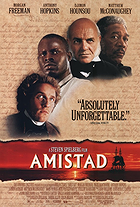 Posted : 17 years, 1 month ago on 21 May 2008 03:57
(A review of Amistad)
Posted : 17 years, 1 month ago on 21 May 2008 03:57
(A review of Amistad)
Amistad is straightforwardly one of Steven Spielberg's greatest motion pictures: an uncompromising, violent history lesson that does not succumb to telling a story of one of the tiring traditional historical events such as the American Civil War, the holocaust, etc. As an alternative to these aforementioned events that have been endlessly told in Hollywood productions, Spielberg tackles a poignant and imperative true story pertaining to the abolition of slavery that had yet to be explored on film.
Set in 1839, a Spanish slave trading vessel known as 'La Amistad' is transporting African prisoners with the intention of selling them into slavery. Not prepared to meekly submit to the harsh conditions they are forced to endure, the Africans stage a violent revolt against their captors. This rebellion is lead by a passionate African named Cinque (Hounsou) whose solitary goal is to sail back home and return to his beloved family. With this objective in mind the Africans inadvertently sail into the shores of the United States. They are captured and detained as runaway slaves. Mindless legal battles between several parties begin to materialise in regards to ownership of the African slaves. These Africans cannot speak a word of English, hence clueless to their probable execution for their violent rebellion. Challenging these assertions is the abolitionist Theodore Joadson (Freeman), a former slave himself, who desires for the Africans to be released and returned to their homeland. Theodore requires a lawyer to represent his position in the courtroom. As a representative he hires property lawyer Roger Baldwin (McConaughey) who believes that he can help.
The film then becomes a fascinating drama as the trial commences and the fate of the confused Africans instigates a battle of words in a confined courtroom. Following various legal proceedings the case is then brought before the US Supreme Court. Facing defeat, Theodore and Roger consult former president and lawyer John Quincy Adams (Hopkins) for help.
Amistad is a gripping legal drama fuelled by a sublime cast. Anthony Hopkins was nominated for an Oscar as John Quincy Adams. This decision is indisputable: for each scene Hopkins features in, he is always a stand-out. The final courtroom speech delivered by Hopkins is driven by poignancy and power. Although said monologue goes for almost 10 minutes there is never a dull second. Every line is attentively thought out. Djimon Hounsou's passionate portrayal is another highlight of the movie. For about 60% of the film's duration the setting is restricted to a courtroom. It can be logically deduced that acting skills of the highest order are absolutely necessary. Hounsou is always compelling and authoritative with his character's motivations blatantly palpable. This is a focused actor who has a great career ahead of him. Recognition must also go to Morgan Freeman and Matthew McConaughey. Freeman is one of the best actors of his generation. He is outstanding! It's refreshing to see Matthew McConaughey playing a unique role. Now that he's notorious for crummy romantic comedies I was a little concerned at first. My fears dissipated very quickly. Combine a mediocre actor with a great director...the results are excellent.
The cinematography by Janusz Kaminski was also nominated for an Oscar. Similar to films like Schindler's List and Saving Private Ryan, Spielberg only uses the best cinematography accessible. This gorgeous cinematography also assisted in keeping my interest during the long courtroom scenes.
An Oscar nomination was also tossed at John Williams for his admirably beautiful score. The film is topped off outstandingly with the commendable directing courtesy of Mr. Steven Spielberg.
Amistad is powerful, compelling and beautiful. Only being marred marginally by its over-length, this film is a praiseworthy historical epic from the master of modern cinema.
 0 comments, Reply to this entry
0 comments, Reply to this entry
Strong entertainment.
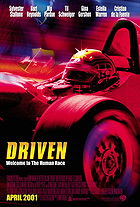 Posted : 17 years, 1 month ago on 21 May 2008 03:37
(A review of Driven)
Posted : 17 years, 1 month ago on 21 May 2008 03:37
(A review of Driven)
Driven met with a negative reception from critics and audiences alike, even permitting the Razzie committee to have a field day with this Stallone-written sport drama. It pains me to admit it, but I found Driven to be unworthy of such an appalling reception. Okay so the movie is clichéd beyond belief and highly predictable from about 20 minutes in; however the film still supplies a fair share of intense racing scenes and boasts a decent cast.
In the world of racing, rookie driver Jimmy Bly (Pardue) is a young hot shot who has won several races throughout the year and is fast challenging the current world champion Beau Brandenberg (Schweiger). Despite Jimmy's early success in the season it rapidly becomes evident that he is struggling to maintain focus and concentration. Jimmy is palpably mentally unfit and his luck will fast run dry. Under constant pressure from his manager (Reynolds) and brother (Leonard), Jimmy is on the verge of cracking. To ease the stress and pressure, Jimmy's manager calls retired racing star Joe Tanto (Stallone) to act as a mentor. Joe is also brought on board as a co-driver to watch over Jimmy while he's on the tracks and to give the rookie some assistance when necessary. With the persistence of Joe's tuition it is hoped that Jimmy will overcome his stress and doubts to proceed throughout the competition and hopefully end up as the new world champion.
Driven had a lot of potential, most of which is terminated by the cliché ridden screenplay. It's painful to think that this is the same man who penned the screenplay for Rocky. I think the main problem here is reluctance to step out of the comfort zone. Instead of staying away from a formulaic structure, Stallone throttles into the clichés at the speed of a race car driver.
Naturally this film has the conventional set of characters standard for the genre. Throw in the proverbial love interest, a few arrogant managers and a sneaky reporter. On the contrary it's relieving to know that screenwriter Stallone did not go for the conventional villain approach. Instead of arrogant and selfish, the powerful Beau Brandenberg does not try to make enemies out of anyone. He shows some depth to his character, especially when someone is in trouble. These mixed sets of characters are portrayed fairly well by the game cast.
Sylvester Stallone's dialogue isn't too hard to understand here. Sometimes that subtitles button does look mighty attractive. Be that as it may, Stallone shows commitment and focus. Obviously many people are welcome to disagree with that previous sentence; however in my opinion Stallone has a lot of talent that usually goes to waste with some dodgy career moves.
Driven may be predictable and clichéd, but the effects look great and the film boasts a number of exhilarating races. Even so, during some of the races the cars begin flying all over the place while slow motion photography kicks in. To make matters worse the special effects for the duration of these shots look dodgy and almost resemble an arcade game.
I'm very fond of the style that director Renny Harlin brought to the production. There's a lot of ultra fast cutting; however the whole thing is very classy and ably directed by Harlin. Many of the key racing scenes become overwhelmingly intense. I was on the edge of my seat for the most part.
It's an interesting creative choice to utilise so many songs throughout the film's duration. About 60% of the chosen music fantastically accompanies its desired scene. The remaining 40% are catchy but unsuitable.
Overall, Driven received a lot of criticism and negativity upon initial release. I found the movie to be filled with clichés and conventions that were to be expected. Regardless of this the film is a lot of fun. It certainly entertained me for its entire running time. Worth seeing.
 0 comments, Reply to this entry
0 comments, Reply to this entry
Kids only! No adults allowed!
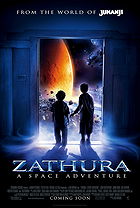 Posted : 17 years, 1 month ago on 20 May 2008 10:14
(A review of Zathura: A Space Adventure)
Posted : 17 years, 1 month ago on 20 May 2008 10:14
(A review of Zathura: A Space Adventure)
Zathura: A Space Adventure transpired to be a children's fantasy movie that is everything I had anticipated: predictable, clichéd, corny and lacklustre. This production was marketed as a follow-up to the 1995 film Jumanji (and tagged as such), which is scarcely unexpected bearing in mind that this is unerringly the same movie except divergently situated in outer space as opposed to a jungle.
The plots of Jumanji and Zathura: A Space Adventure are so intimately related that the principal plot conception is one and the same. Two young brothers named Danny (Bobo) and Walter (Hutcherson) are a pair of typical pre-teen children. Similar to most brotherly relationships the two recurrently argue and squabble much to the exasperation of their father (Robbins). On one boring weekend the two boys are spending time with their father who is balancing his time between his children and his work. While Danny and Walter are bored rigid under the supervision of teen sister Lisa (Stewart), they come across a board game entitled 'Zathura' (plausibly enough, therein lies the title). Little do they realise that this outwardly unexciting board game inhibits the power to generate scary happenings. Once the two begin playing the game they cannot stop - and are transported into the far reaches of outer space! With virtually every move the game flings every manner of space peril at the two siblings who need to sort out their squabblings and finish the game or else they could be trapped in space everlastingly.
Zathura: A Space Adventure is strictly for the children as opposed to the adults. When you're a kid you care just for the marvellous visual images and creative special effects. But as you reach adulthood you cannot excuse the obvious plot holes, inconsistencies and predictability. Sure, the film has a good message about being good to your siblings...however these themes are exactly the same in Jumanji as well as several other pointless films made by Hollywood to attract a young audience and a treasure chest of money.
The problem with this particular film is how by-the-numbers the whole thing is. What dooms a concept like this is that we all know the ending: the game will finish, the characters will overcome their differences and everything will go back to normal. Because the experience is so blatantly predictable this is a 95-minute film you can honestly afford to miss.
The acting is certainly questionable at times. The two little kids are always unfathomably annoying. Jonah Bobo does not bring any life to his role. Each line he delivers sounds forced and rehearsed. Josh Hutcherson isn't any better. Thankfully there are a few adult actors who try their hardest. I think the downfall of the children characters is the way they are written. Their decisions are stupid, dialogue is artificial and the situations aren't handled in a realistic way.
Jon Favreau only succeeds in delivering a mild escapism fantasy. I still expected more from the man who helmed Elf in 2003. That film is by no means perfect. On the contrary it's a lot more fun than this uneven children's film. Zathura: A Space Adventure is kids only territory, with adults prohibited. The kids will certainly find the film to be fun and amusing. If you've passed this age range I suggest you give this one a miss without dwelling on the thought.
 0 comments, Reply to this entry
0 comments, Reply to this entry
Lacking action, but an absorbing war drama
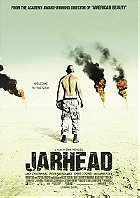 Posted : 17 years, 1 month ago on 19 May 2008 12:59
(A review of Jarhead)
Posted : 17 years, 1 month ago on 19 May 2008 12:59
(A review of Jarhead)
Jarhead is the newest directorial feature from much-admired UK-born director Sam Mendes (a man who has helmed a number of outstandingly successful movies including American Beauty and Road to Perdition): this is an absorbing film regarding the dramas of war. Mendes' intricately made film is set in the harsh deserts of Kuwait scarcely preceding the first Gulf War.
Based on memoirs of a soldier who developed his own memories of the experience, Jarhead is centred on young Anthony "Swoff" Swofford (Gyllenhaal) who has recently joined the Sniper Corps in the United States Marines. In the vein of Stanley Kubrick's Full Metal Jacket, this film looks in-depth at the physically and mentally arduous boot camp training undertaken by the soldiers prior to being deployed to defend their country. Before being sent to the desert, the film delves into the personal life of Swofford; his relationship with his girlfriend, private habits, etc. The rest of the movie is concerned with the soldiers dealing with the boredom they endure in the middle of the scorching hot desert. Swoff befriends another sniper named Alan Troy (Sarsgaard) and his Staff Sergeant Sykes (Foxx).
Being told from the perspective of Swofford alone, the film chronicles several pivotal points in the war and always keeps the viewer up to date with the current situation: this includes the present number of soldiers in the country, and how long the protagonists have endured in the desert.
Mendes also has a prime focus on the aspects of war that are so rarely seen: the sheer boredom, the genuine camaraderie between the men, the list of things to do when bored, training incidents, wild parties, friendly fire incidents and disciplinary action.
If people approach this film with anticipations of a combat-driven, violent production you will be drastically disappointed. Instead of combat, the focus of Jarhead is to convey the frustrations of war from the perspective of a soldier deprived of the action and large-scale battles that so many other war movies have portrayed. In a sense it's a refreshing alteration on the conventional formula. In spite of being refreshing and original, the lack of action takes its toll on the film value. It contains all the elements of a great war movie: absorbing drama, realistic characters, a large arsenal, massive build up...but the build up is for absolutely nothing. I can appreciate the fact that Mendes focused on the drama and the experiences of one man who was frustrated because he never killed somebody; however in this case it's more that the source material let the movie down. After seeing the film, I felt somewhat unsatisfied because all the lead-up was for nothing but a wild party and a sudden ending. Like most of Sam Mendes' work he has us so captivated in his world that the ending is incredibly shocking and unforeseeable.
Due to Jarhead being a dialogue driven war drama, the actors are required to do a good job. In this case, both Jake Gyllenhaal and Peter Sarsgaard are outstanding. Their portrayals are utterly flawless. They don't just play their characters, they actually become their characters. A quality that's rare in most contemporary movies.
Jarhead has been filmed beautifully. Especially towards the precious little combat that occurs towards the end I was enthralled by its gorgeous landscape and naturalistic colour palette.
All in all, Jarhead is a war film that certainly has room for improvement. Despite its shortcomings and minor flaws this film is still a great piece of entertainment. It's a bold move to make a war movie sans the combat and I believe that Sam Mendes masterfully handled the material.
 0 comments, Reply to this entry
0 comments, Reply to this entry
 Login
Login
 Home
Home 183 Lists
183 Lists 1671 Reviews
1671 Reviews Collections
Collections